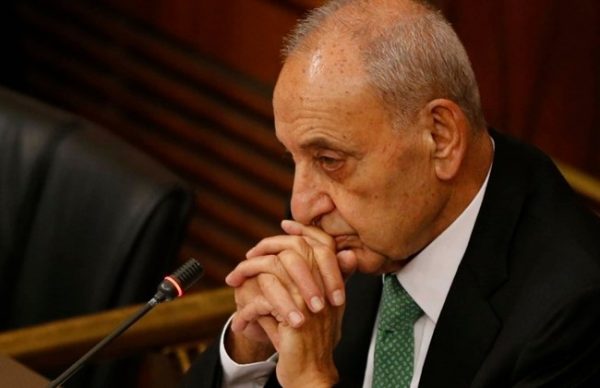 Speaker Nabih Berri said the situation in Lebanon is “critical” requiring “drastic” solutions, al-Joumhouria daily reported on Saturday.
Speaker Nabih Berri said the situation in Lebanon is “critical” requiring “drastic” solutions, al-Joumhouria daily reported on Saturday.
“No doubt the situation is critical in Lebanon and requires quick solutions,” he told the daily in an interview.
Berri pinned hope on the regional developments which he said could “positively” affect the situation in the country, the daily added on Saturday.
He revealed that several measures have been taken and “intensive meetings were held to address the crisis, decisions were made at Baabda economic meeting and hopefully the Cabinet will finish discussing the 2020 draft budget.”
Addressing the link between the regional developments and the circumstances in Lebanon, Berri said the country could benefit from a restoration of dialogue between Saudi Arabia and Iran.
“We must take into consideration the accelerating regional developments mainly the one in Yemen after the Saudi agreement on a ceasefire in several regions. Shall it develop positively any further, it could restore channels of dialogue between Saudi Arabia and Iran. If this development goes in this direction, it would have a positive impact on the whole region and on Lebanon in particular,” said Berri.
Dollar shortage
Lebanon has maintained a fixed exchange rate (1,507.5) LBP between the Lebanese pound and US dollar, but on Thursday, the exchange rate at money changers reportedly reached 1,600 LBP, because the central bank has been limiting the supply of US dollars in the market to defend the Lebanese pound
The shortage of the dollar restricted the ability of many traders to import key items like wheat , fuel and medicine which prompted (Banque du Liban) CBD to issue instructions to regulate the provision of funds to import these key items
“The real reasons for the crisis are BDL’s attempt to reduce the snap up to convert from the Lebanese pound to the dollar because this leads to shrinking in the central bank’s foreign reserves, this ammunition is used to defend the Lebanese pound,” said former Economy Minister and banker Raed Khoury in remarks to al-Joumhouria daily.
Khoury said BDL “adopts policies to control the monetary situation in light of the decline in remittances from abroad.”
He said BDL is “buying time in order to preserve the financial system in Lebanon.”
Lebanese media this week reported that banks and money exchange houses were rationing their dollar sales over a feared shortage in reserves.
But central bank governor Riad Salameh on Monday denied that Lebanon was facing a dollar crisis.
BDL said on Tuesday it will issue a circular to regulate the provision of funds to import wheat, fuel and medicine.
Growth in Lebanon has plummeted in the wake of repeated political deadlocks in recent years, compounded by eight years of war in neighbouring Syria and friction between the Iranian backed Hezbollah militant group and Israel.
The Lebanese economy depended greatly on tourism and most of the tourists used to come from the Arab Gulf countries , but Hezbollah’s relations with Iran has drastically reduced the number of Arab tourists to Lebanon for security reasons.
Remittance inflow to Lebanon from Lebanese diaspora in the Arab Gulf countries has been drastically reduced due to tension in the Gulf between Iran and Saudi Arabia. Remittances from the Gulf represented in the past over 60 % of the total inflow.
Remittances in Lebanon averaged 570.71 USD Million from 2003 until 2018, reaching an all time high of 1378 USD Million in the fourth quarter of 2004.
The sanctions against Iran and its proxies including Hezbollah are adding fuel to the current financial crisis in Lebanon
Lebanon’s public debt stands at around $86 billion — higher than 150 percent of GDP — according to the finance ministry.
Eighty percent of that figure is owed to Lebanon’s central bank and local banks.
Ratings agencies Fitch and Moody’s bumped Lebanon down to “CCC” over what they called “intensifying pressure on Lebanon’s financing model”.
Standard & Poor’s kept Lebanon’s “B-/B” rating, but said that could slide over the next year if banking system deposits and the central bank’s foreign exchange reserves continued to fall.
In July, parliament passed its 2019 budget, which is expected to trim Lebanon’s deficit to 7.59 percent of GDP — a nearly 4-point drop from the previous year.

Leave a Reply
You must be logged in to post a comment.